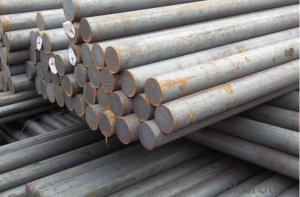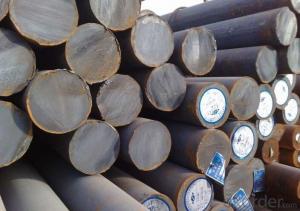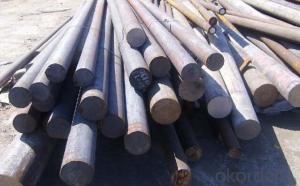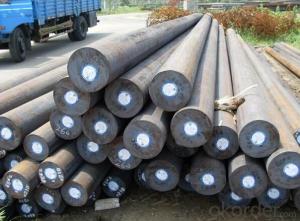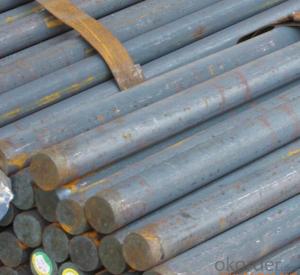Hot Rolled Mild Steel Round Bar Q235 Q345 Q355
- Loading Port:
- Tianjin
- Payment Terms:
- TT OR LC
- Min Order Qty:
- 3 m.t.
- Supply Capability:
- 10000 m.t./month
OKorder Service Pledge
OKorder Financial Service
You Might Also Like
Item specifice
Hot Rolled Mild Steel Round Bar Q235 Q345 Q355
Name | SAE1045 Carbon Steel Round Bar |
Shape | Round Bar/Square Bar/Flat Bar/Plate/Wire |
Standard | GB/ASTM/SAE/AISI/DIN/JIS/EN/BS |
Surface Treatment: | Black/Peeling/Polished/Machined |
Delivery Condition: | Hot Rolled or Forged/Peeled or Black Surface |
Test | SGS/UT 100% Elements Testing |
Certificate: | ISO/Mill Certificate |
Service: | 24 hours online service / |
more than 20 years trading and manufacture | |
Quality Assurance: | the third party inspection, such as SGS, BV, TUV…etc. is acceptable |
Packaging Details: | seaworthy packaging or as per customer's packing instruction |
Products Overview
Product Name | Typical Grades | Diameter(mm) | Standard adopted |
Carbon Steel | 20 (1020/S20C/C22) | Ø16-Ø300 | GB/SAE/JIS/DIN |
40 (1040/S40C/C40) | |||
45 (1045/S45C/C45) | |||
Bearing Steel | GCr9 (51100/SUJ1) | Ø12-Ø250 | |
GCr15 (52100/SUJ2/100Gr6) | |||
GCr9SiMn (A485-Gr.1/SUJ3) | |||
Cr-Mo Steel | 20Cr (5120/SCr420H/20Cr4) | Ø12-Ø250 | |
40Cr (5140/SCr440/41Cr4) | |||
42CrMo(4140/SCM440/42CrMo4) | |||
Gear Steel | 20CrNiMo | Ø16-Ø600 | |
20CrMn(5115/SMnC420/20MnCr5) | |||
20CrNiMo(8620/SNCM220/20CrMiMo2) |
Packaging & Delivery
Packaging Detail | Sea worthy packing /as per customer's packing instruction |
Delivery Detail | 15 ~ 40 days after receiving the deposit |
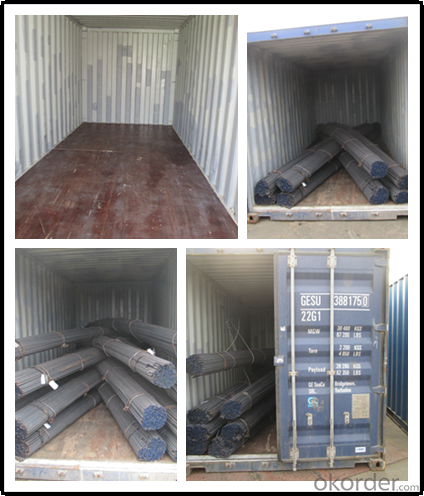
Product Show
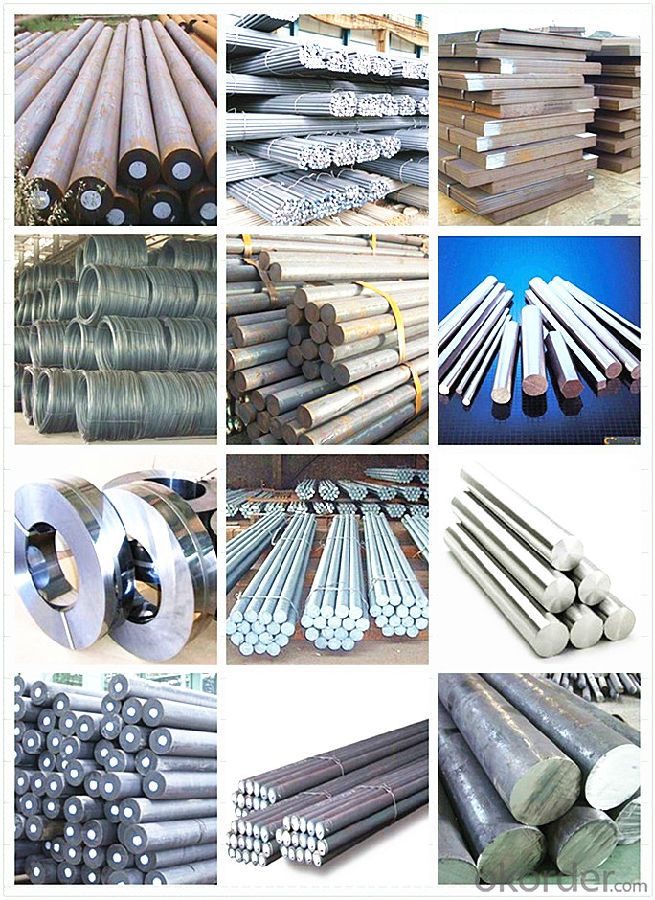
Workshop
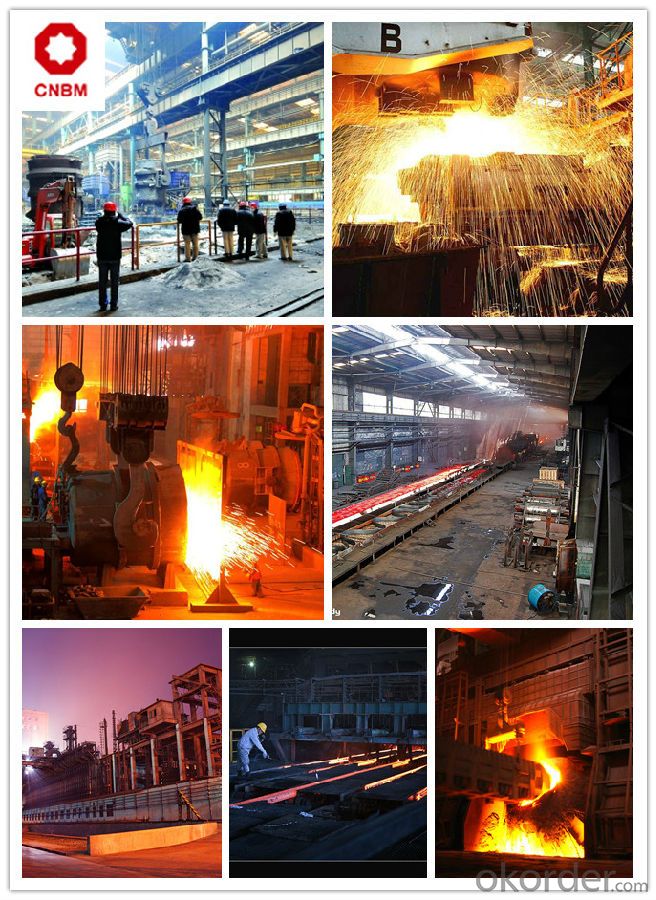
FAQ
Are you a trading company or manufacturer? | Manufacturer |
What’s the MOQ? | 3 metric ton |
What’s your delivery time? | 15-35 days after downpayment received |
Do you Accept OEM service? | Yes |
what’s your delivery terms? | FOB/CFR/CIF |
What's the Payment Terms? | 30% as deposit,70% before shipment by T/T |
Western Union acceptable for small amount. | |
L/C acceptable for large amount. | |
Scrow ,Paybal,Alipay are also ok | |
Why choose us? | Chose happens because of quality, then price, We can give you both. |
Additionally, we can also offer professional products inquiry, products knowledge train (for agents), smooth goods delivery, excellent customer solution proposals. | |
What's your available port of Shipment? | Main Port, China |
What’s your featured services? | Our service formula: good quality+ good price+ good service=customer's trust |
Where are your Market? | Covering more than 160 countries in the world |
- Q:How is precipitation-hardening steel used in the aerospace industry?
- Precipitation-hardening steel, also known as PH steel, is extensively used in the aerospace industry due to its exceptional strength-to-weight ratio and excellent corrosion resistance. This type of steel undergoes a heat treatment process that enables the formation of fine precipitates within its structure, resulting in improved mechanical properties. In aerospace applications, precipitation-hardening steel is commonly utilized for manufacturing critical components such as landing gear, engine parts, and structural elements. Its high strength and durability allow for the construction of lighter and more fuel-efficient aircraft, enhancing overall performance and safety in the aerospace sector.
- Q:What are the different types of special steel?
- There are several types of special steel, including stainless steel, tool steel, high-speed steel, carbon steel, alloy steel, and maraging steel. These different types of special steel are designed to possess specific properties and characteristics that make them suitable for various applications across industries such as construction, automotive, aerospace, and manufacturing.
- Q:What are the factors that affect the wear resistance of special steel?
- There are several factors that affect the wear resistance of special steel, including the composition of the steel itself, the hardness of the steel, the presence of any alloying elements, the microstructure of the steel, and the heat treatment process used. Other factors such as the type and intensity of the wear, environmental conditions, and lubrication also play a role in determining the wear resistance of special steel.
- Q:Can special steel be used for precision instruments?
- Yes, special steel can be used for precision instruments. Special steel, known for its high strength, durability, and resistance to corrosion, is often used in the manufacturing of precision instruments such as surgical tools, watches, measuring devices, and scientific equipment. Its unique properties allow for precise and accurate performance, making it an ideal material choice for precision instruments.
- Q:What are the main characteristics of heat-resistant steel?
- Heat-resistant steel, known as high-temperature steel as well, is an alloy with specific properties that enable it to endure extreme temperatures without sacrificing its mechanical strength and integrity. The primary features of heat-resistant steel are as follows: 1. Thermal fatigue resistance: Heat-resistant steel is designed to endure cyclic heating and cooling without developing cracks or fractures. This characteristic allows it to maintain its structural integrity, even in environments with rapid temperature fluctuations. 2. Exceptional creep resistance: Creep refers to the gradual deformation that occurs in a material when exposed to high temperatures over an extended period. Heat-resistant steel exhibits exceptional resistance to creep, ensuring that it retains its shape and strength even under prolonged heat exposure. 3. Preservation of mechanical properties at elevated temperatures: Unlike regular steel, which experiences a significant reduction in strength and hardness at high temperatures, heat-resistant steel retains its mechanical properties even under extreme conditions. This property makes it suitable for applications in industries such as aerospace, power generation, and oil and gas. 4. Resistance to oxidation and corrosion: Heat-resistant steel possesses a high resistance to oxidation and corrosion at elevated temperatures. It forms a protective oxide layer on its surface, preventing the underlying material from being attacked by oxygen or other corrosive elements. This property enhances the longevity and reliability of components made from heat-resistant steel. 5. Excellent thermal conductivity: Heat-resistant steel exhibits outstanding thermal conductivity, allowing it to efficiently transfer heat away from its surface. This feature proves particularly beneficial in applications where heat dissipation is crucial, such as in heat exchangers and furnace components. 6. Minimal thermal expansion: Heat-resistant steel has a relatively low coefficient of thermal expansion, meaning it expands and contracts minimally when subjected to temperature changes. This characteristic ensures dimensional stability and reduces the risk of warping or distortion under thermal stress. In summary, the main characteristics of heat-resistant steel make it an ideal material for applications that involve exposure to high temperatures, such as furnace components, exhaust systems, gas turbines, and heat exchangers. Its ability to endure extreme heat while maintaining its structural integrity and mechanical properties make it a critical material in industries where temperature resistance is of utmost importance.
- Q:What are the different types of wear-resistant steel?
- There are several different types of wear-resistant steel, including AR400, AR500, Hardox, and Domex. These steels are specifically designed to withstand abrasion and provide excellent durability in applications where materials are subjected to constant wear and impact.
- Q:What are the different methods for improving the corrosion resistance of special steel?
- There are several methods for improving the corrosion resistance of special steel. 1. Alloying: One of the most common methods is to add alloying elements to the steel composition. These elements, such as chromium, nickel, and molybdenum, form a protective layer on the surface of the steel, preventing corrosion. Stainless steel, for example, contains a high amount of chromium, which forms a passive film that protects the steel from corrosive environments. 2. Surface treatments: Various surface treatments can be applied to special steel to enhance its corrosion resistance. These treatments include electroplating, hot-dip galvanizing, and chemical passivation. Electroplating involves coating the steel with a layer of metal, such as zinc or nickel, which acts as a sacrificial anode, protecting the steel from corrosion. Hot-dip galvanizing involves immersing the steel in molten zinc, forming a durable, corrosion-resistant coating. Chemical passivation involves treating the steel with a solution that removes surface impurities and forms a protective oxide layer. 3. Protective coatings: Applying protective coatings can significantly improve the corrosion resistance of special steel. Coatings such as paint, epoxy, or polyurethane can act as a barrier, preventing moisture and corrosive substances from coming into contact with the steel surface. These coatings can be applied by spray, dip, or powder coating methods. 4. Heat treatment: Heat treatment can modify the microstructure of special steel, improving its corrosion resistance. Processes such as annealing, quenching, and tempering can alter the steel's properties, making it more resistant to corrosion. Heat treatment can also relieve internal stresses, which can contribute to corrosion. 5. Environmental control: Controlling the environment in which the special steel is used can also help improve its corrosion resistance. This includes measures such as maintaining proper humidity levels, controlling pH, avoiding exposure to corrosive chemicals, and implementing effective ventilation systems. By minimizing the exposure of special steel to corrosive elements, its corrosion resistance can be enhanced. Overall, a combination of these methods can be employed to improve the corrosion resistance of special steel, ensuring its longevity and performance in corrosive environments.
- Q:Can special steel be used in the medical device manufacturing industry?
- Yes, special steel can be used in the medical device manufacturing industry. Special steel alloys, such as stainless steel or titanium, are commonly used in medical device manufacturing due to their excellent corrosion resistance, biocompatibility, and strength characteristics. These alloys are specifically designed to meet the stringent requirements and regulations of the medical industry, making them ideal for producing safe and durable medical devices.
- Q:What are the main characteristics of pressure vessel steel?
- The main characteristics of pressure vessel steel include high strength, good weldability, excellent toughness, and resistance to corrosion and high temperatures. These properties make it suitable for containing fluids or gases under high pressure, ensuring the safety and reliability of the vessel in various industrial applications.
- Q:How does special steel contribute to the oil and gas industry?
- Special steel plays a crucial role in the oil and gas industry by offering enhanced strength, durability, and corrosion resistance needed for various applications. It is used in the construction of pipelines, drilling equipment, storage tanks, and offshore platforms, ensuring reliable and safe operations in harsh environments. Additionally, special steel's high heat resistance enables it to withstand extreme temperatures in refining processes, while its resistance to cracking and wear ensures the longevity of critical components. Overall, special steel contributes significantly to the oil and gas industry by providing the necessary materials for efficient and secure exploration, production, and transportation of oil and gas resources.
1. Manufacturer Overview |
|
|---|---|
| Location | |
| Year Established | |
| Annual Output Value | |
| Main Markets | |
| Company Certifications | |
2. Manufacturer Certificates |
|
|---|---|
| a) Certification Name | |
| Range | |
| Reference | |
| Validity Period | |
3. Manufacturer Capability |
|
|---|---|
| a)Trade Capacity | |
| Nearest Port | |
| Export Percentage | |
| No.of Employees in Trade Department | |
| Language Spoken: | |
| b)Factory Information | |
| Factory Size: | |
| No. of Production Lines | |
| Contract Manufacturing | |
| Product Price Range | |
Send your message to us
Hot Rolled Mild Steel Round Bar Q235 Q345 Q355
- Loading Port:
- Tianjin
- Payment Terms:
- TT OR LC
- Min Order Qty:
- 3 m.t.
- Supply Capability:
- 10000 m.t./month
OKorder Service Pledge
OKorder Financial Service
Similar products
New products
Hot products
Related keywords

